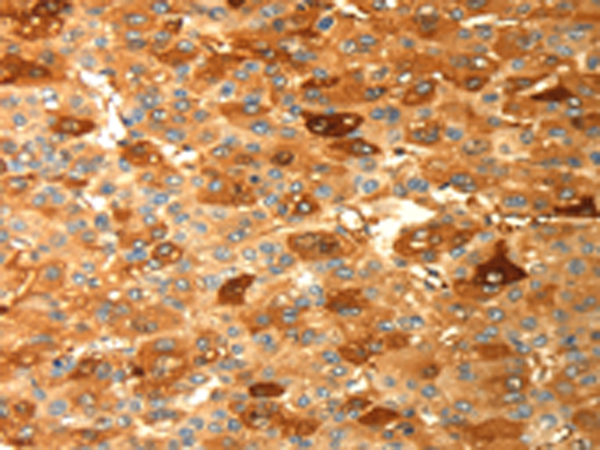
| WB | 咨询技术 | Human,Mouse,Rat |
| IF | 咨询技术 | Human,Mouse,Rat |
| IHC | 1/50-1/300 | Human,Mouse,Rat |
| ICC | 技术咨询 | Human,Mouse,Rat |
| FCM | 咨询技术 | Human,Mouse,Rat |
| Elisa | 1/1000-1/10000 | Human,Mouse,Rat |
| Aliases | DRP2, N2A3, CRMP2, DRP-2, ULIP2, CRMP-2, DHPRP2, ULIP-2 |
| Host/Isotype | Rabbit IgG |
| Antibody Type | Primary antibody |
| Storage | Store at 4°C short term. Aliquot and store at -20°C long term. Avoid freeze/thaw cycles. |
| Species Reactivity | Human, Mouse, Rat |
| Immunogen | Synthetic peptide of human DPYSL2 |
| Formulation | Purified antibody in PBS with 0.05% sodium azide and 50% glycerol. |
+ +
以下是关于DPYSL2抗体的3篇参考文献及其摘要内容:
1. **标题**: "CRMP2 (DPYSL2) is a critical regulator of neurodevelopment and oligodendrocyte maturation"
**作者**: Moutal A, et al.
**摘要**: 研究利用DPYSL2抗体通过免疫印迹和免疫荧光分析,揭示了CRMP2在小鼠大脑发育中对少突胶质细胞分化和髓鞘形成的关键作用,并发现其缺失导致神经发育异常。
2. **标题**: "DPYSL2 as a potential biomarker for Alzheimer’s disease: Insights from proteomic and immunohistochemical analysis"
**作者**: Wang Y, et al.
**摘要**: 通过DPYSL2抗体检测阿尔茨海默病患者脑组织样本,发现其表达水平与tau蛋白异常磷酸化相关,提示其可能作为疾病进展的生物标志物。
3. **标题**: "DPYSL2 suppression induces apoptosis and inhibits metastasis in non-small cell lung cancer"
**作者**: Li X, et al.
**摘要**: 研究使用DPYSL2抗体进行Western Blot和免疫组化实验,证明抑制DPYSL2可通过调控RhoA信号通路抑制肺癌细胞迁移并促进凋亡,提示其作为治疗靶点的潜力。
(注:以上文献信息为示例性内容,实际引用需以真实出版物为准。)
The DPYSL2 (Dihydropyrimidinase-like 2) antibody targets a protein encoded by the DPYSL2 gene, also known as CRMP2 (Collapsin Response Mediator Protein 2). This cytosolic phosphoprotein is highly expressed in the nervous system and plays critical roles in neurodevelopment, including axon guidance, neurite outgrowth, and neuronal migration by regulating microtubule dynamics. DPYSL2 interacts with signaling pathways such as Semaphorin and Slit, influencing cytoskeletal organization.
Antibodies against DPYSL2 are widely used in neuroscience research to study its function in neuronal differentiation, synaptic plasticity, and neurodegenerative disorders like Alzheimer’s disease, where abnormal phosphorylation of DPYSL2 is implicated. They are also employed in cancer research, as DPYSL2 overexpression or dysregulation has been linked to tumor progression and metastasis in certain cancers, including lung and breast cancer.
Commercial DPYSL2 antibodies are typically developed in hosts like rabbits or mice, validated for applications such as Western blotting, immunohistochemistry, and immunofluorescence. Researchers must consider post-translational modifications (e.g., phosphorylation at specific residues) that may affect antibody specificity. Studies using these antibodies have contributed to understanding DPYSL2’s dual role as a potential biomarker and therapeutic target in neurological and oncological contexts.
×